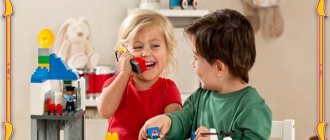Conversation with parents. work program
"Organizing a conversation with parents."
Conversations between the teacher and parents are the most accessible and widespread form of establishing communication between the teacher and the family, his systematic communication with the father and mother of the child, and with other family members.
The purpose of a pedagogical conversation is to exchange opinions on a particular issue of education and achieve a common point of view on these issues, providing parents with timely assistance.
A conversation can be used in working with parents as an independent form or in combination with other forms: a conversation when visiting a family, at a parent meeting, consultation.
Features of the conversations:
- The leading role here is given to the teacher; he plans the topic and structure of the conversation in advance.
- The active participation of both the teacher and parents in the conversation is an essential feature of this form, which allows for an effective influence on parents.
- Sometimes a teacher, having given advice to parents, made an instruction, a remark, believes that he has talked with the parents, but it remains unclear what the parents themselves thought about this: how they perceived the advice, remark, how they plan to implement the teacher’s recommendations, what, in their opinion father or mother, was the cause of deviations in the child’s behavior, which makes it difficult for them to develop this or that skill, ability, quality, etc., i.e. there was no substantive conversation.
- The conversation is best conducted in order to prevent conflict situations, to establish relationships between parents and children, between individual teachers and the family.
It is necessary to use conversation when working with parents in order to achieve a trusting atmosphere and identify difficult points of contact in conflict situations. The results of the conversation should not become public if one of the participants does not want it. In a conversation, the teacher should listen and hear more, and not give educational recommendations or edify.
- When conducting a conversation, it is recommended to choose the most appropriate conditions and start it with neutral questions, then move directly to the main topics.
- If the conversation arose spontaneously (usually in this case, it is initiated by the parents) and the teacher cannot give the father or mother the necessary attention, he arranges a special meeting with the parents at a time convenient for them. Other parents may be invited to this conversation, for whom, in the opinion of the teacher, participation in a conversation on this topic is useful. But it is necessary to take into account: if the issues raised in the conversation are related to intra-family relationships, the presence of strangers is undesirable - the atmosphere of the conversation should be conducive to frankness. And in the case when the conversation arises on the initiative of the parents, caused by their questions, judgments, proposals, the teacher should take charge of the conversation: he gives it the right direction, draws conclusions.
- If the initiator of the conversation is a teacher, he thinks in advance where he will start it, what questions he will ask parents in order to reveal their understanding of the issues under discussion and their attitude towards them. When agreeing with parents on the time of the conversation, the teacher informs the topic and asks them to prepare questions to which they would like to receive an answer. When planning the topics of conversations, it is necessary to strive, if possible, to cover all the problematic aspects of raising children.
Pedagogical conversation must meet certain requirements:
- first of all, this is their specificity and content; as a result of the conversation, parents should receive new knowledge on the issues of teaching and raising children
- the conversation should awaken parents’ interest in pedagogical problems and increase their sense of responsibility for raising children.
- What is important is the lively nature of the conversation, goodwill, but the friendly tone in which the conversation is conducted does not exclude the teacher from presenting the necessary demands.
In order to achieve contact with parents during the conversation and involve them in the discussion, the teacher must provide a number of conditions:
- Consider the place and time of the conversation.
- Parents should have enough time to discuss the planned issues without rushing.
- During the conversation, nothing should distract those talking. There should be no strangers whose presence might embarrass the parents, although there are times when the teacher deliberately seeks to attract the attention of other parents and involve them in conversation.
- It is better to start the conversation with more general, neutral questions.
- The teacher always has facts that positively characterize the child. These facts must definitely be applied in conversations, then the negative things that the teacher is forced to say about the child are not perceived so painfully by the parents.
Of course, in subsequent conversations, the teacher must find out how his advice was implemented by the parents, and what has changed in the child’s upbringing.
When using a conversation as a means of obtaining information about raising a child in a family, the teacher must keep in mind that this information is not always sufficiently reliable. The fact is that people’s actual behavior and their own assessment of this behavior may not coincide and even come into conflict, especially when assessing family relationships. Therefore, knowledge about the nature of raising a child in a family, obtained in a conversation, should be supplemented and clarified when the teacher visits the family, his observations of the relationship between parents and child.
Material for conversations with parents is given to the teacher by observing the child: his compliance with the rules of behavior in a team, his attitude towards children, adults and their demands, his attitude towards activities; conversations with the child, revealing his knowledge, ideas, motives of behavior.
The friendliness of the teacher, the validity of his assessments and the conclusions he makes from the perspective of the child’s interests, make parents want to openly express their opinions, share their impressions, and talk about the child’s behavior in the family.
Thus, conversation is a means of establishing contacts with parents, studying the child’s family upbringing and influencing the nature of this upbringing.
Basic rules for establishing good personal contact and building effective communication and interaction with parents.
Basic requirements for conducting a conversation.
Preparing for the conversation:
- Determine the purpose of the conversation. Otherwise the conversation is a fruitless conversation. The true goals of the conversation should not be known to the interlocutor.
- Determine the target questions you will ask. Rank the questions in order of importance. Create a conversation plan based on your specific situation.
- Identify questions that support the conversation. Based on the needs and interests of the interlocutor.
Making contact with the interlocutor.
- Questions to keep the conversation going. Ask questions that interest your interlocutor in order to interest him.
- Do not start with questions that cause negative feelings in the interlocutor. If you see the passivity of your interlocutor: you started with a bad question, he is not in the mood, took the wrong tone, hit a sore spot - try to immediately correct the mistake - be active - attentive.
How to conduct a conversation correctly.
- What's the best way to ask questions? Do not ask questions “head-on” (it is better to ask them in an indirect form). Questions should be brief and understandable to the interlocutor.
- Listen carefully and confidentially. Show this to your interlocutor with your gaze, facial expressions, gestures, and with your whole body tilted towards the interlocutor. By sympathizing, approving and supporting, you can hear the maximum amount of information.
- Give your interlocutor an opportunity to speak. Don't rush him. Approve the accuracy of the thoughts expressed. Ask counter questions to help you speak up or to validate the accuracy of your thoughts.
- Do not interrupt the interlocutor's statements. The interlocutor always talks about things that are significant to him. Remember! When a conversation is interrupted, contact is lost and important information may be lost.
Basic moments:
- Give your interlocutor a chance to talk.
- Express your interest using supportive expressions (“Did I understand correctly?”, “Did I mix up anything?”, “Do you think that...”, etc.)
- Summarize the most important statements.
- Don't interrupt the other person.
- Don't contradict.
- Ask questions.
Techniques for interacting with parents.
- Friendly style of communication between teachers and parents.
A positive attitude towards communication is the solid foundation on which work with parents is built. In communication, categoricality and a demanding tone are inappropriate. Daily friendly interaction between teachers and parents means much more than a single well-executed event.
- Individual approach.
It is necessary not only when working with children, but also when working with parents. The teacher, when communicating with parents, must feel the situation, the mood of mom or dad. This is where the teacher’s human and pedagogical ability to reassure the parent, sympathize and think together about how to help the child in a given situation comes in handy.
- Collaboration, not mentoring.
The position of instruction and simple propaganda of pedagogical knowledge will not bring positive results. It will be much more effective to create an atmosphere of mutual assistance and support for the family in difficult pedagogical situations, to demonstrate the interest of the kindergarten staff in understanding the family’s problems and a sincere desire to help.
- We are preparing seriously.
Any event, even the smallest one, to work with parents must be carefully and seriously prepared. A weak, poorly prepared parent meeting or seminar can negatively impact the positive image of the institution as a whole.
- Dynamism.
A kindergarten today should be in development mode, not functioning, be a mobile system, and quickly respond to changes in the social composition of parents, their educational needs and educational requests.
Individual consultation for parents on the problem of social and psychological development
Individual consultation for parents on the problem of social and psychological development
Protocol for individual consultation for parents.
Topic: “How to overcome a child’s shyness and insecurity.”
Goal: to help parents overcome their child’s shyness and insecurity
Consulting objectives:
1. Discuss with parents the problem of the influence of shyness and uncertainty on the student’s educational success.
To promote the formation of parents' desire to help their own child overcome shyness and uncertainty
Selection of diagnostic material: questionnaire for parents, personal observation of the child, leaflets (brochures) for parents.
Preliminary work: observing the child.
Description of the child. Maxim Ivanov, 6 years old, senior group. The level of physical and intellectual development corresponds to age.
-Family composition, social status. The family is complete, prosperous, there are two children in the family. Both parents are involved in raising the child. The mother has a higher education, works as a pharmacist, and the father has a higher education and works as a foreman.
-The main problem: the child’s shyness and uncertainty.
-How does this problem manifest itself in the child’s behavior?
Maxim is afraid to answer in class, although he knows the answer. When you start communicating with her, she answers, but with the answers you need to help her, push her to communicate. Analyze your attitude towards your child. Of course you love him. But do you always express this love in actual behavior? How often do you tell your baby how much you love him? Love just like that, for nothing. Look at the situation in the family through the eyes of a child. Maybe he lacks expressions of your love, praise, support? After all, we so often pay attention to our children only when they do something badly, and do not notice their achievements. Good deeds. Shy children cause less trouble for parents than mischievous and naughty children. Therefore, less attention is paid to them, while it is these children who need it to a greater extent.
They do not declare this openly, but their needs for friendly attention and respect for their personality are highly developed. Without satisfying these needs, the child does not lay the foundation that underlies his development - trust in people, which allows him to actively and fearlessly enter the world around him, creatively master it and transform it. An adult must cultivate the ability to be attentive to a child not only when he asks for help and support, but also when, at first glance, he does not need it.
Issues for discussion:
— The influence of shyness and uncertainty on the educational success of a preschooler
— Ways to overcome a child’s shyness and uncertainty at home and in kindergarten.
Planning group consultations for parents
Planning group consultations for parents
Goal: assistance in understanding your own child, in finding and choosing adequate ways, means and methods of education; familiarization with the general patterns of child development; increasing the socio-psychological competence of parents, teaching them communication skills, resolving conflict situations, improving the style of parental behavior.
Tasks: can be classified based on the characteristics of each period of the child’s development and the range of problems that he must solve at each stage independently.
• changing the psychological attitude of teachers and parents on the role of the family in shaping the child’s personality
• diagnostics of the family, the conditions of family education and the needs of parents
• widespread use of the pedagogical capabilities of the parents themselves (rights and responsibilities, interests and capabilities of parents)
• organization of psychological and pedagogical assistance to the family
• the use of active forms of communication with parents, developing pedagogical skills, family communication skills, psychological and pedagogical vigilance.
Time: 2 times a month
Duration: 1-1.5 hours in the evening
Effectiveness: as a result of the survey, the specific effects are an increase in their sensitivity to the child, the development of a more adequate understanding of children's capabilities and needs, the elimination of psychological and pedagogical illiteracy, a productive reorganization of the arsenal of means of communication with the child.
We see the relevance of working with parents in the fact that parents very often spontaneously relate to the process of upbringing. It happens that the reasons for difficulties in communication lie in the position of the parents themselves. Some of them make mistakes in their upbringing, but do not want to see them, correct them, and sometimes simply not notice them, blaming them on the influence of society. The style of communication with parents and the fact of his acceptance in the family as an individual capable of self-development also have a great influence on the development of the child.
Long-term planning of group consultations for parents
Month
Participants Topics Purpose Contents
September
Parents of the nursery and junior groups. preschool age Child's adaptation to new social conditions.
How to help your child adapt faster to kindergarten. Introduce parents to the adaptation process. Definition of the concept of “adaptation”, levels of adaptation. Test for parents “How does your child adapt.” Types of assistance in the adaptation process from parents.
September
Parents of all age groups Features and patterns of development of a preschool child. Give an idea of the characteristics of children's development along the main lines of development. Features of child development, drawing up a portrait with the help of parents. Test drawing for parents “I am a child, an adult, a parent”; test interpretation.
October
Middle-aged and older parents Problems of children are problems of parents.
Helping parents solve problems in learning, development and communication with the child. Consideration and discussion of anonymous questions, exchange of life experiences, familiarity with psychological and pedagogical literature. Active participation of all parents
November
Parents of the nursery and junior groups. preschool age What parents need to know about children's stubbornness and capriciousness. Introducing parents to the psychology of raising young children. Define the concepts of capriciousness and stubbornness. Characteristics of the emotional development of a child of early and early preschool age, features of the course of age-related crises. Manifestation of stubbornness and capriciousness in behavior, ways of communicating with a child in such situations, satisfying the need for personal realization of one’s “I”
Suggestions from parents on the issue of drawing up a portrait of “ideal parents”, comparing oneself with the proposed portrait
December Parents of all age groups Relationships in the family. Do you know your child?
Definition of relationships within the family; development of ideas about your child, development of a new style of relationships. Test method “Family Circle”. Defining relationships in the family, difficulties, communication style, drawing up an individual portrait of the child according to
observations of the teacher and parents
To introduce the characteristics of the emotional development of young children; disorders in emotional development, methods and methods of correction using non-traditional techniques. Characteristics of emotional development in chronological order. Features of the age period from 0 to 1 year of life, from 2 to 3 years. Difficulties in controlling behavior during these periods. Correction methods, removal of negativity.
January
Parents of middle and older age groups How we raise our child (methods of encouragement and punishment). Determining the educational potential of parents using rewards and punishments.
Is it possible to do without punishment? Workshop for parents; "round table"; discussion of existing rewards and punishments; the reasons for certain actions, the sources of their origin, the pros and cons of each method, the impact on the personal development of the child. Solving problem situations
February
Parents of middle and older groups Children's aggressiveness Factors provoking the emergence of children's aggressiveness. Features of behavior and methods of correction through the organization of a game situation. The influence of the family on the emergence of aggressive behavior as a method of defense. Consideration of specific pedagogical situations, cases of manifestation of aggressive behavior towards children, adults, objects. Correction of aggressive behavior, building new relationships, displacing aggressive reactions through non-traditional techniques.
March
Parents of all age groups About the characteristics of psychological and social development Individual characteristics of the child’s development. Drawing up a portrait of the child based on observation and psychological testing (at the request of the parents) Individual consultations for parents on issues of education, development and upbringing of the child. Individual age characteristics. Temperamental characteristics, properties of the nervous system, character, types of activities, etc.
April
Diagnosis of readiness for school, constituent elements. Child self-esteem as an important element in school readiness. Introduction to test methods. Testing, types of test methods, conversations when admitting a child to school. Recommendations regarding conversations with the teacher, the child’s focus on learning at school. Exchange of experience between parents.
May
Parents of all age groups How to develop a child at home. Why does a child need play? Acquaintance with existing educational programs, types of educational games and their organization. The influence of home development on the formation of a child’s personality. Parents are given ready-made cards with existing games for children of different ages to familiarize themselves with and play with their parents. Discussion of the influence of games on child development. Development of cognitive and mental activity, communication.




